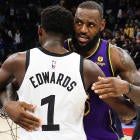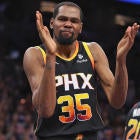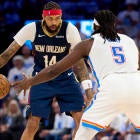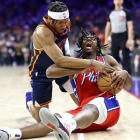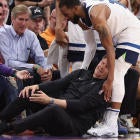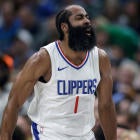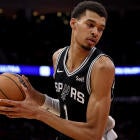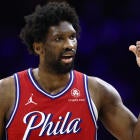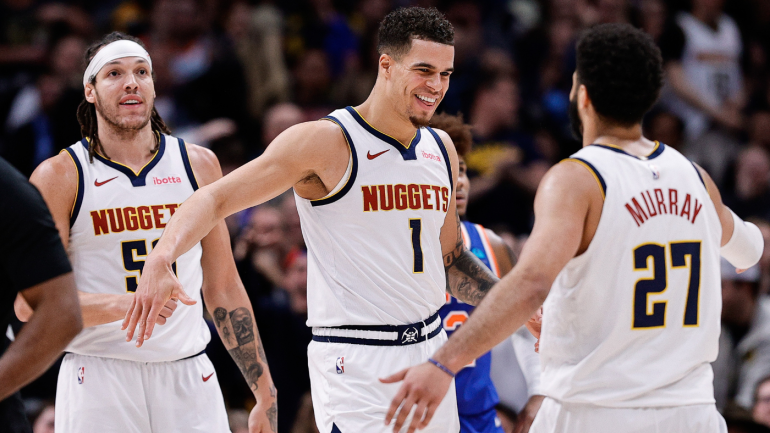
Yesterday, we covered the five most important lineups in the Eastern Conference as the NBA's postseason approaches. Conceptually, settling on those lineups was fairly straightforward. Boston is the favorite, and every other lineup choice was built around disrupting the Celtics.
The Western Conference is much more complicated. Denver is certainly the favorite, but there are far more contenders scattered around the conference than there are in the East. It's not a stretch to suggest that six or seven Western Conference teams could qualify as the second-best team in the East. That makes settling on the most important lineups in that conference a messier process.
Ultimately, we had to extend the list to six (but more on that later). In truth, though, it's reasonable to suggest that the Western Conference champion doesn't even emerge from this group. Winning the West isn't about beating a single team. It's about beating three of the nine other very different teams in your field.
Denver Nuggets
- Lineup: Jamal Murray, Kentavious Caldwell-Pope, Peyton Watson, Michael Porter Jr., Aaron Gordon
- Total possessions: 38
- Net rating: +20.3
When you face the Nuggets in the postseason, they are going to use their starting lineup for roughly 20 minutes per game. You are going to lose those minutes. Make peace with that. Denver's starters posted a +9.4 net rating in the playoffs last season. They're at +13.5 this regular season. Much like the peak Stephen Curry-era Warriors, the key to beating the Nuggets is beating their bench.
Denver found a nifty solution to that problem last postseason when they turned Aaron Gordon into their backup center. Suddenly, what was once Denver's biggest weakness became a relative strength. The Nuggets won the Gordon-at-center minutes, which more or less checkmated any possible opposition. But this year's menu of no-Jokic options is a bit thinner than last year's. Bruce Brown and Jeff Green, arguably Denver's two most important reserves during the 2023 championship run, are gone.
The real choices facing Michael Malone are A) whether he's willing to use all four of his other starters when Jokic rests and B) who warrants the last slot or two during those Jokic-less minutes? The Nuggets have used their Gordon-at-center look so sparingly during the regular season that there's no easy answer. Watson makes the most sense on paper because of what he'll do for Denver's defense. The Nuggets could comfortably switch 2-5 in this alignment, a badly needed wrinkle in a West absolutely loaded with shooting.
Ultimately that final choice is going to be matchup-dependent. Denver might have to play bigger without Jokic against Minnesota, for instance, and Gordon might be too important as a perimeter defender against, say, Phoenix for the strategy to work there. But it took the Nuggets years to find an approach that was even bearable when their best player went to the bench. For opponents, bearable is the best you can really ask for.
Minnesota Timberwolves
- Lineup: Anthony Edwards, Nickeil Alexander-Walker, Kyle Anderson, Naz Reid, Rudy Gobert
- Total possessions: 183
- Net rating: +35
Minnesota's success without Karl-Anthony Towns has been well-documented. They are now 11-5 since he got hurt largely with Naz Reid filling in as the starting center. Yet it largely hasn't been the starters thriving during this period. Minnesota's typical lineup with Reid in Towns' place has only a +4.8 net rating, according to Cleaning the Glass. Common sense suggests that this probably won't be an especially important Minnesota unit in the playoffs either. Towns is going to start when he returns. Players of his prominence don't come off of the bench.
But we can be realistic about the fact that Towns likely won't be at 100%, and that makes Reid's minutes significantly more important overall. His best unit by far has been this one, with Edwards at the point and Gobert at center. The Alexander-Walker/Anderson pairing on the wings is particularly suited to Reid's strengths: it's defensively oriented, but both of them are strong passers for their position that can both find Reid for open 3s and take advantage of his athleticism near the rim.
The beauty of having Reid is that he can play with Gobert, with Towns or without either of them. He's a starting-caliber center and power forward on both ends of the floor. That insurance policy has carried Minnesota through the end of the regular season, and if Towns is at all banged up when the playoffs arrive, it's going to carry them through at least the early stages of the postseason as well.
Oklahoma City Thunder
- Lineup: Shai Gilgeous-Alexander, Isaiah Joe, Lu Dort, Jalen Williams, Chet Homgren
- Total possessions: 213
- Net rating: +24.7
When we covered the Eastern Conference yesterday, we talked about Boston's jumbo Al Horford-Kristaps Porzingis lineup as Joe Mazzulla's inevitable first adjustment. That's what this lineup is to Mark Daigneault, and we've already seen that play out in big games. This was the change Oklahoma City made in its first game after the All-Star break, a critical matchup against the Clippers. They led by two at halftime in that game and won by 22 in the end.
The difference between Oklahoma City and Boston is that the Celtics are so much better than the field in their conference that the Celtics might not ever need to adjust. The Thunder absolutely will, and it's going to come early. Their first-round opponent, whoever it is, will ignore Josh Giddey from deep. That's just the reality of starting a below-average 3-point shooter than isn't your primary ball-handler or an essential defender. Giddey's secondary ball-handling and transition game is just more powerful on the bench in a playoff setting.
But Joe's shooting? That supercharges Shai Gilgeous-Alexander. Oklahoma City's MVP candidate is leading the league in virtually every driving stat by a mile, and when Joe is on the floor, the floor is so spaced that he might as well be walking a red carpet to the basket. Easy points are hard to come by in the playoffs. They're readily available when Joe plays with the starters. Before Oklahoma City's season is over, they will either have moved Joe into the starting lineup or will at least be giving him more minutes alongside it than Giddey.
Phoenix Suns
- Lineup: Devin Booker, Bradley Beal, Eric Gordon, Grayson Allen, Kevin Durant
- Total possessions: 106
- Net rating: +28.5
Hey, speaking of supercharged offenses, let's talk about Phoenix's rarely used but lethal "Kevin Durant at center" alignment. I've covered what makes that look so unstoppable in depth here, but here's the short version: Your defense might have an answer for Durant, it might have an answer for Devin Booker, it might have an answer for Bradley Beal and it might have an answer for five-out spacing... but there isn't a defense in the NBA that has an answer for all of those things. When the Suns overcame a 22-point fourth-quarter deficit to beat the Kings in January, it was with this lineup leading the way.
But there's a reason the Suns have barely used this lineup. It's not sustainable. Durant can't take the physical pounding that playing center requires. He's a great secondary rim-protector but a sorely lacking primary rim-protector, especially in a conference with as many offensively inclined big men as the 2024 West. Durant at center is a short-burst attempt to give an opponent math problems. Essentially, it posits that Phoenix can make more 3s in a short period than the opponent can make 2s even when those 2s are relatively easy to come by.
That's a dangerous, high-variance approach to basketball. It is also Phoenix's only real chance to beat the best of the West. There is no version of this team that is going to defend opponents like the Nuggets or Mavericks adequately. Every point guard in the conference is licking his chops at the prospect of running pick-and-roll against Jusuf Nurkic and blowing by him on the perimeter. In a stylistically conventional game, the Suns will lose. Their only hope is to overwhelm their opponent with their best attribute: offense. That's what this group can do. It's only a matter of how long they're able to do it.
Los Angeles Lakers/Dallas Mavericks
- Lakers lineup: D'Angelo Russell, Austin Reaves, Rui Hachimura, LeBron James, Anthony Davis
- Mavericks lineup: Luka Doncic, Kyrie Irving, Derrick Jones Jr., P.J. Washington, Daniel Gafford
- Lakers total possessions/net rating: 759/+6.3
- Mavericks total possessions/net rating: 329/+17.6
So let's start with the obvious question: why lump the Lakers and Mavericks together? Because they both represent similar things. Whether through trade (Dallas) or proper lineup alignment (Los Angeles), both of these teams needed nearly the entire season to actually find themselves. Neither is going to be seeded appropriately based solely on how well they are playing today. That's what playing in one of the best conferences of all time can do. No team, not even multi-star teams, can get away with half-a-season of directionless basketball.
Both of these lineups pose similar problems for opponents, but in different ways. In short, it is the combination of size and skill that makes them so lethal. Dallas is now starting four players that are at least 6-foot-6. The trickle-down effects are felt on both sides of the floor. Size heals a lot of wounds defensively, but it also forces opponents to put smaller players on Doncic offensively. Good luck sticking your shooting guard on one of the strongest ball-handlers in basketball.
The Lakers exert their muscle more so in the front court. They are effectively starting three power forwards, all of whom can handle the ball better than most players of their size. Pair that trio with D'Angelo Russell and Austin Reaves in the back court and the Lakers barely need an offensive hierarchy. Everyone can create their own shot. Everyone but Hachimura is an above-average passer. Everyone but Davis is an above-average shooter. The Laker offense ranked 21st before Hachimura was permanently inserted into the starting lineup. It ranks No. 3 since. They've become a matchup nightmare.
Both of these teams are hoping the bracket breaks properly for them. They won't have home-court advantage in perhaps any series they enter. But they're playing better than teams ahead of them in the standings right now because, after months of struggling, they've finally landed on their identities. In both cases, that identity is the combination of size and skill.














